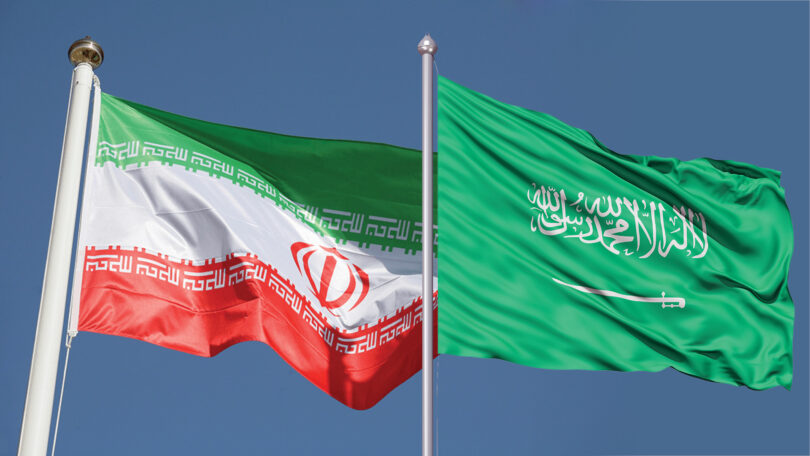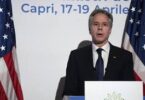ABU DHABI (Agencies): Iran and Saudi Arabia have agreed to re-establish ties and reopen embassies within two months, according to Iranian and Saudi state media.
The agreement came on Friday after talks held in the Chinese capital, Beijing.
“As a result of the talks, Iran and Saudi Arabia agreed to resume diplomatic relations and re-open embassies … within two months,” Iranian news agency IRNA reported on Friday.
Iranian state media posted images and video described as being taken in China with the meeting. It showed Ali Shamkhani, the council’s secretary, with Saudi national security adviser Musaad bin Mohammed al-Aiban and Wang Yi, China’s most senior diplomat.
“After implementing of the decision, the foreign ministers of both nations will meet to prepare for exchange of ambassadors,” Iranian state television said.
In the footage aired by Iranian media, Wang could be heard offering “whole-hearted congratulations” on the two countries’ “wisdom”.
“Both sides have displayed sincerity,” he said. “China fully supports this agreement.”
The Saudi Press Agency confirmed the agreement when it also published the joint statement from Saudi Arabia and Iran, which said that the two countries had agreed to respect state sovereignty and not interfere in each other’s internal affairs.
The statement also said that Riyadh and Tehran had agreed to activate a security cooperation agreement signed in 2001.
Iran’s state-run IRNA news agency quoted Shamkhani as calling the talks “clear, transparent, comprehensive and constructive”.
“Removing misunderstandings and the future-oriented views in relations between Tehran and Riyadh will definitely lead to improving regional stability and security, as well as increasing cooperation among Persian Gulf nations and the world of Islam for managing current challenges,” Shamkhani was quoted as saying.
Tensions have long been high between the regional rivals.
Saudi Arabia broke off ties with Iran in 2016 after protesters invaded Saudi diplomatic posts there.
Saudi Arabia had executed a prominent Shia Muslim scholar days earlier, triggering the demonstrations.
Shia-majority Iran and Sunni Muslim Saudi Arabia support rival sides in several conflict zones across the Middle East, including in Yemen where the Houthi rebels are backed by Tehran, and Riyadh leads a military coalition supporting the government.
But there have been more recent efforts on both sides to warm ties.
“In the last couple of years, there had been meetings between Saudi and Iranian officials in Baghdad,” said Al Jazeera’s Ali Hashem reporting from Tehran. “The Iraqis started mediation talks back in 2021. Everything stopped during the Iraqi elections of 2021,” he said.
“There was no news comings out after five rounds of talks. Security-level meetings took place in Oman, too. Those were mainly concentrated on the situation in Yemen.”
Iran and Saudi Arabia are on rival sides of a number of regional issues, in countries as varied as Lebanon, Syria and Yemen.
Improved relations between Tehran and Riyadh could therefore have an effect on politics across the Middle East.
“The security situation in the region, like in Yemen and Lebanon, deteriorates and suffers when these two countries have differences,” said Hashem.
“With this deal, it is possible that we might start to see compromises in these countries. This deal can lead to the creation of a better security situation in the region. They have a lot of leverage in these countries.”
Adnan Tabatabai, the CEO of the CARPO think tank, told Al Jazeera that China “has a real big interest” in not seeing the regional security situation “descend into chaos”.
“[Like] in 2019, when the waterways of Hormuz were the sites of different explosions and attacks,” he said.
“There are inherent interests for the Chinese to try and use the leverage that they have towards both Tehran and Riyadh to make some efforts to balance these relations and finalise what the Iraqis and Omanis had in fact started.”
China, which recently hosted Iran’s hard-line President Ebrahim Raisi, is also a top purchaser of Saudi oil. President Xi Jinping, just awarded a third five-year term as president earlier on Friday, visited Riyadh in December to attend meetings with oil-rich Gulf Arab nations crucial to China’s energy supplies.
A White House National Security Council spokesperson said the United States is aware of reports that Iran and Saudi Arabia have resumed diplomatic relations, but referred further details to the Saudis.
“Generally speaking, we welcome any efforts to help end the war in Yemen and de-escalate tensions in the Middle East region. De-escalation and diplomacy together with deterrence are key pillars of the policy President Biden outlined during his visit to the region last year,” the spokesperson told Reuters.







